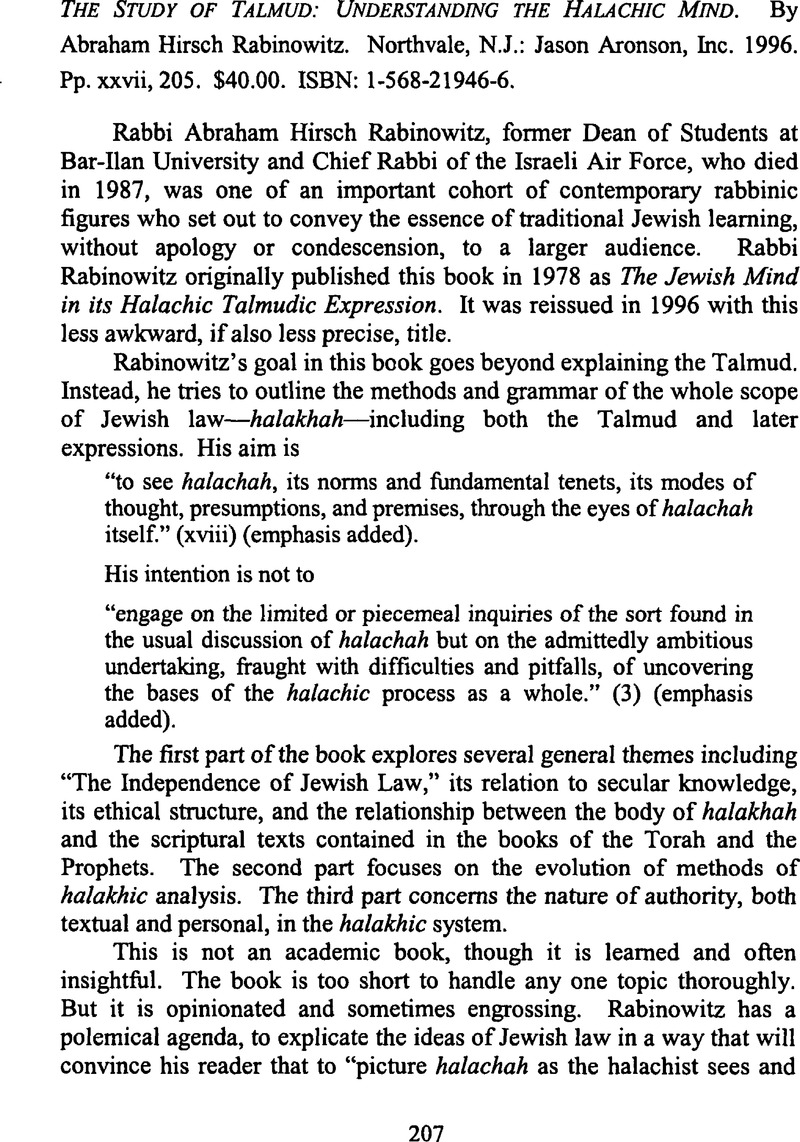No CrossRef data available.
Article contents
The Study of Talmud: Understanding the Halachic Mind. By Abraham Hirsch Rabinowitz. Northvale, N.J.: Jason Aronson, Inc.1996. Pp. xxvii, 205. $40.00. ISBN: 1-568-21946-6.
Published online by Cambridge University Press: 24 April 2015
Abstract

- Type
- Review Essays and Book Reviews
- Information
- Copyright
- Copyright © Center for the Study of Law and Religion at Emory University 2002
References
1. For my own attempt at part of an answer, see The Oral Law and the Jurisprudence of a Text-less Text, S'vara, A. J. of Phil., L., & Judaism 11 (Winter 1991)Google Scholar.
2. See Patterson, Dennis, Law and Truth (Oxford U. Press 1996)Google Scholar.
3. See Hart, H.L.A., The Concept of Law 56–57 (2d ed,. Oxford U. Press 1994)Google Scholar; Dworkin, Ronald, Law's Empire 13–14 (Harv. U. Press 1986)Google Scholar.
4. I strongly rely in this discussion on Yisroel Taplin, Troper, Zalman & Trabert, Ken, The Date Line in Halacha: A Halachic Guide to the Laws of the Date Line Condensed from Sefer Taarich Yisroel (Y. Taplin 1999)Google Scholar. My text here also draws some language from “This Month,” a short unpublished essay of my own.
5. B.T. Shabbat 107b.
6. Rabinowitz alludes to this sort of possibility, as for example in a one-sentence, elliptical, reference to debates over the Jewish status of groups such as the Ethiopian Jews: “There are numerous problems, especially those involving the ingathering of the scattered tribes of Israel, that could possibly be dealt with on historical and other grounds, but halachah cannot accept such solutions” (15-16). But his discussion here should have been less ambiguous and sketchy, and more forthcoming.
7. See Berkovits, Eliezer, Not In Heaven: The Nature and Function of Halakhah (Ktav Publg. House 1983)Google Scholar; Kirschenbaum, Aaron, Equity in Jewish Law: Beyond Equity: Halakhic Aspirationalism in Jewish Civil Law (Yeshiva U. Press 1991)Google Scholar; Wurzburger, Walter W., Ethics of Responsibility: Pluralistic Approaches to Covenantal Ethics (Jewish Publication Socy. 1994)Google Scholar; Lichtenstein, Aharon, Does Jewish Tradition Recognize an Ethic Independent of Halakhah?, in Modern Jewish Ethics: Theory and Practice 62 (Fox, Marvin ed., Ohio State U. Press 1975)Google Scholar.
8. Lichtenstein, supra n. 7, at 63-64.
9. For an extended argument along similar lines, see Dane, Perry, The Yoke of Heaven, The Question of Sinai, and the Life of Law, 44 U. Toronto L. J. 353 (1994)CrossRefGoogle Scholar.




